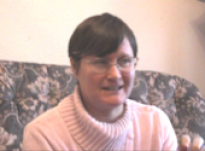Interview 33

Had first routine mammogram at age 51. Calcifications found which were benign. Three months later DCIS was discovered. Had a second operation, and breast cancer was discovered. Had a third operation, radiotherapy and tamoxifen.
A teacher, single with no children.
More about me...
She describes her experiences of having a breast x-ray.
She describes her experiences of having a breast x-ray.
You went in the building next door and then went left and I remember being given a form to fill in, this questionnaire "have you ever had anyone with breast cancer?" et cetera and I filled in all this.
And then I was shown into a small corridor-like room where there was a bench and I sat down with a few other people and I remember opposite me there were changing rooms. And I sat down and waited and then I was called to go into one of the changing rooms, put on a gown, which I did. And then I was brought into the mammogram room and I remember they took about 5 or 6, it seemed to be a good few X-rays of my breasts, both breasts. It didn't seem very sore, just uncomfortable. And I remember going out again and changing and thinking to myself well "that will be three years before I will be back here", you know, that was nothing.
Having a core biopsy was painful and distressing.
Having a core biopsy was painful and distressing.
They got me in for my needle and my core biopsy, which was the first time I'd ever had it. The needle wasn't too sore but the core biopsy was like a kind of a pellet gun that they put over my breast and that was quite sore. And I remember crying and one of the Nurses bringing me, the only thing she had was paper towels which was such a shame I thought. And I remember being terribly aware of myself staring at a picture of some kind of a medical thing or something on the wall and I remember going, when I was upset, going out of the room I thought "Why didn't they have a nice picture of flowers or something to look at whenever we're in that situation", it was so kind of distressing.
She was recalled and tests suggested she had DCIS. When the affected area was removed though, the pathology report was benign.
She was recalled and tests suggested she had DCIS. When the affected area was removed though, the pathology report was benign.
So I went out and waited and then they called me back again into the room. No, first of all they called me to a Doctor and the Doctor sat me down and she showed me X-rays and she referred to these little white specks on my x-ray. Now all I could see were white pin pricks on the breast, she said "These denote changes" and, after my questions, she said "until proven otherwise they could be cancer." But she said they only denote changes and it is calcifications of the breast. And she said "I'm going to send you out again to get a needle and then a biopsy and you should be getting your results today of your needle".
And then I went on Friday and I got the second biopsy and that's when she said DCIS definitely, that second one. She did definitely say it when I got the second biopsy results. Yes. And then she gave me the operation date.
And in the operation they would be taking out the DCIS?
Yes, that's what they were taking out and then they were going to send it to the Pathologist who would tell me if it was cancerous or whatever.
So they sent it off to the Pathologist and then they told you that was all benign?
Yes, they told me it was benign. That was the word they used 'benign' and I thought "Oh great". And the Doctor seemed very happy and we seemed very happy and she said "I won't see you until three months", so I was delighted.
Was upset when diagnosed but now feels grateful her breast cancer was detected and treated early.
Was upset when diagnosed but now feels grateful her breast cancer was detected and treated early.
You know, from the very beginning I didn't, you know, I couldn't believe that I had breast cancer but the more I meet people, the more I read and the more I, you know, hear about it, is that I'm very lucky. They've caught it at the beginning and thank God for breast screening because they would never have got it.

